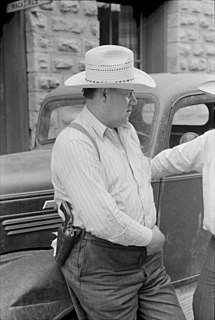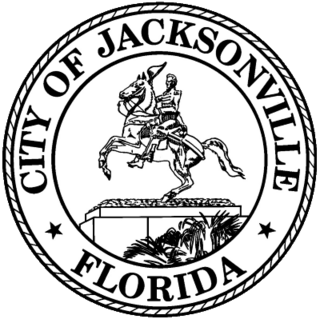
The Voting Rights Act of 1965 is a landmark piece of federal legislation in the United States that prohibits racial discrimination in voting. It was signed into law by President Lyndon B. Johnson during the height of the civil rights movement on August 6, 1965, and Congress later amended the Act five times to expand its protections. Designed to enforce the voting rights guaranteed by the Fourteenth and Fifteenth Amendments to the United States Constitution, the Act sought to secure the right to vote for racial minorities throughout the country, especially in the South. According to the U.S. Department of Justice, the Act is considered to be the most effective piece of federal civil rights legislation ever enacted in the country. It is also "one of the most far-reaching pieces of civil rights legislation in U.S. history."

Sunset Valley is a city in Travis County, Texas. The population was 749 at the time of the 2010 census. An enclave, it is surrounded on all sides by the city of Austin.

The NAACP Legal Defense and Educational Fund, Inc. is a leading United States civil rights organization and law firm based in New York City.
Disparate impact in United States labor law refers to practices in employment, housing, and other areas that adversely affect one group of people of a protected characteristic more than another, even though rules applied by employers or landlords are formally neutral. Although the protected classes vary by statute, most federal civil rights laws protect based on race, color, religion, national origin, and sex as protected traits, and some laws include disability status and other traits as well.
The Mexican American Legal Defense and Educational Fund (MALDEF) is a national non-profit civil rights organization formed in 1968 by Jack Greenberg to protect the rights of Latinos in the United States. Founded in San Antonio, Texas, it is currently headquartered in Los Angeles, California and maintains regional offices in Sacramento, San Antonio, Chicago, and Washington, D.C.

Partido Nacional de La Raza Unida is a former Hispanic political party centered on Chicano (Mexican-American) nationalism. It was created in 1970 and became prominent throughout Texas and Southern California. It was started to combat growing inequality and dissatisfaction with the Democratic Party that was typically supported by Mexican-American voters. After its establishment in Texas, the party launched electoral campaigns in Colorado, Arizona, New Mexico, and California, though it only secured official party status for statewide races in Texas. It did poorly in the 1978 Texas elections and dissolved when leaders and members dropped out.
Kelton Gray Seliger, known as Kel Seliger, is a Republican member of the Texas State Senate for District 31, which stretches from the Panhandle south to the Permian Basin. He has announced that he will not be running for re-election in 2022.

Affirmative action in the United States is a set of laws, policies, guidelines, and administrative practices "intended to end and correct the effects of a specific form of discrimination" that include government-mandated, government-approved, and voluntary private programs. The programs tend to focus on access to education and employment, granting special consideration to historically excluded groups, specifically racial minorities or women. The impetus toward affirmative action is redressing the disadvantages associated with past and present discrimination. Further impetus is a desire to ensure public institutions, such as universities, hospitals, and police forces, are more representative of the populations they serve.

The recorded history of Austin, Texas, began in the 1830s when Anglo-American settlers arrived in Central Texas. In 1837 settlers founded the village of Waterloo on the banks of the Colorado River, the first permanent settlement in the area. By 1839, Waterloo would adopt the name Austin and become the capital of the Republic of Texas.

Disfranchisement after the Reconstruction era in the United States, especially in the Southern United States, was based on a series of laws, new constitutions, and practices in the South that were deliberately used to prevent Black citizens from registering to vote and voting. These measures were enacted by the former Confederate states at the turn of the 20th century. Efforts were made in Maryland, Kentucky, and Oklahoma. Their actions were designed to thwart the objective of the Fifteenth Amendment to the United States Constitution, ratified in 1870, which prohibited states from depriving voters of their voting rights on the basis of race. The laws were frequently written in ways to be ostensibly non-racial on paper, but were implemented in ways that purposely suppressed black voters. Beginning in the 1870s, white racists used violence by domestic terrorism groups, as well as fraud, to suppress black voters. After regaining control of the state legislatures, Southern Democrats were alarmed by a late 19th-century alliance between Republicans and Populists that cost them some elections. After achieving control of state legislatures, white bigots added to previous efforts and achieved widespread disfranchisement by law: from 1890 to 1908, Southern state legislatures passed new constitutions, constitutional amendments, and laws that made voter registration and voting more difficult, especially when administered by white staff in a discriminatory way. They succeeded in disenfranchising most of the black citizens, as well as many poor whites in the South, and voter rolls dropped dramatically in each state. The Republican Party was nearly eliminated in the region for decades, and the Southern Democrats established one-party control throughout the Southern United States.
The International Association of Black Professional Firefighters (IABPFF), founded in 1970, is a fraternal organization of black firefighters. It represents more than 8000 fire service personnel throughout the United States, Canada, and the Caribbean, organized in 180 chapters.

Oak Hill is an unincorporated community and collection of neighborhoods located in southwest Austin, Texas.

In the United States, a sheriff is an official in a county or independent city responsible for keeping the peace and enforcing the law. Unlike most officials in law enforcement in the United States, sheriffs are usually elected, although some states have laws requiring certain law enforcement qualifications of candidates. Elected sheriffs are accountable directly to the citizens of their county, the constitution of their state, and ultimately the United States Constitution.

The government of Jacksonville is organized under the city charter and provides for a "strong" mayor–council system. The most notable feature of the government in Jacksonville, Florida, is that it is consolidated with Duval County, which the jurisdictions agreed to in the 1968 Jacksonville Consolidation.
Ricci v. DeStefano, 557 U.S. 557 (2009), is a United States labor law case of the United States Supreme Court on unlawful discrimination through disparate impact under the Civil Rights Act of 1964.
Northwest Austin Municipal Utility District No. 1 v. Holder, 557 U.S. 193 (2009), was a decision of the United States Supreme Court regarding Section 5 of the Voting Rights Act of 1965, and in particular its requirement that proposed electoral-law changes in certain states must be approved by the federal government. In a 9–0 decision, the Court concluded that the district was eligible to apply for an exemption (bailout) from this section per Section 4(a), because the definition of "political subdivision" in Section 14(c)(2) included a district of this nature. In an 8–1 opinion, the Court declined to rule on the constitutionality of that provision, citing the principle of constitutional avoidance.

Lesbian, gay, bisexual, and transgender (LGBT) people in Texas face some legal and social challenges not faced by other people. Same-sex sexual activity was decriminalized in the state in 2003 by the Lawrence v. Texas ruling. On June 26, 2015, the Supreme Court of the United States ruled bans on same-sex marriage to be unconstitutional in Obergefell v. Hodges. Texas has a hate crime statute that strengthens penalties for certain crimes motivated by a victim's sexual orientation, although it is rarely invoked. Gender identity is not included in the hate crime law. Even though federal law prohibits employment discrimination based on sexual orientation or gender identity, there is no statewide law banning anti-LGBT discrimination. However, some localities in Texas have ordinances that provide a variety of legal protections and benefits to LGBT people.
Texas Civil Rights Project (TCRP) is an 501(c)(3) nonprofit organization based in Austin, Texas, that advocates for voter rights, racial and economic justice, and criminal justice reform. It was formated in 1990 by attorney James C. Harrington.
Shelby County v. Holder, 570 U.S. 529 (2013), was a landmark decision of the Supreme Court of the United States regarding the constitutionality of two provisions of the Voting Rights Act of 1965: Section 5, which requires certain states and local governments to obtain federal preclearance before implementing any changes to their voting laws or practices; and Section 4(b), which contains the coverage formula that determines which jurisdictions are subject to preclearance based on their histories of discrimination in voting.
Texas has a total of 254 counties, many cities, and numerous special districts, the most common of which is the independent school district.











